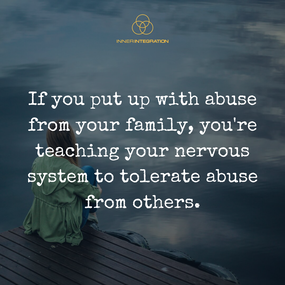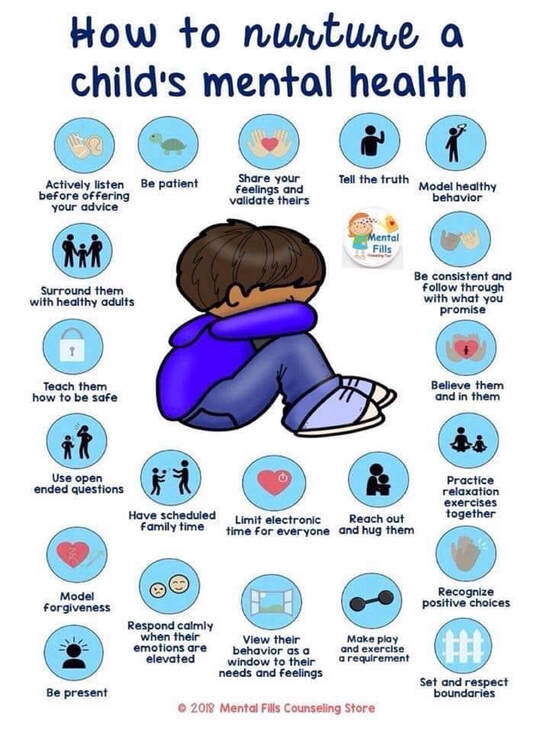Childhood Trauma and Attachment Styles
|
Meredith Miller with Inner Integration said it best when she described that it's very difficult to accept the idea that someone in your family is an abuser. This is often because of the way they justify or minimize it when you call out their unacceptable behavior. They'll gaslight you and then you'll end up justifying their reasons for abusing you. As an adult you'll keep repeating the pattern of tolerating abuse because it's what you lived in your family. Until you can identify it and accept this reality, your nervous system will keep betraying you by accepting more abuse. If you accept abuse from your own family, you'll accept it from anyone else.
To learn more about Toxic Childhood relationships, click here. |
"Adverse childhood experiences are the single greatest unaddressed public health threat facing our nation today."
~Dr. Robert Black, M.D., former President of the American Academy of Pediatrics
~Dr. Robert Black, M.D., former President of the American Academy of Pediatrics
The four attachment styles are:
- Secure Attachment – Securely attached adults tend to be more satisfied in their relationships. Children with a secure attachment see their parent as a secure base from which they can venture out and independently explore the world. A secure adult has a similar relationship with their romantic partner, feeling secure and connected, while allowing themselves and their partner to move freely.
- Anxious Preoccupied Attachment – Unlike securely attached couples, people with an anxious attachment tend to be desperate to form a fantasy bond. Instead of feeling real love or trust toward their partner, they often feel emotional hunger. They’re frequently looking to their partner to rescue or complete them. Although they’re seeking a sense of safety and security by clinging to their partner, they take actions that push their partner away.
- Dismissive Avoidant Attachment – People with a dismissive avoidant attachment have the tendency to emotionally distance themselves from their partner. They may seek isolation and feel “pseudo-independent,” taking on the role of parenting themselves. They often come off as focused on themselves and may be overly attending to their creature comforts.
- Fearful Avoidant Attachment – A person with a fearful avoidant attachment lives in an ambivalent state, in which they are afraid of being both too close to or too distant from others. They attempt to keep their feelings at bay but are unable to. They can’t just avoid their anxiety or run away from their feelings. Instead, they are overwhelmed by their reactions and often experience emotional storms. They tend to be mixed up or unpredictable in their moods.
- Abandonment Issues, Childhood Emotional Neglect, and Adult Loneliness / Lisa A. Romano. Do you struggle with abandonment issues? Have you been the victim of childhood emotional neglect? Have you been raised by a narcissist or alcoholic? Are you a lonely adult today? Childhood emotional neglect is abuse. Child abuse can be covert as well as overt.
- Attachment Addiction Comes from Attachment Injuries / Alan Robarge. If you would rather have someone in your life that treats you poorly and is toxic just for "love," then this one is for you. Typically this comes from childhood trauma where someone was not seen, known, heard, and/or understood and unfortunately, this will show up in your romantic relationships as well unless you do the work to heal yourself.
- Attachment Trauma and Longing / Alan Robarge. In this video, Relationship Coach and Psychotherapist, Alan Robarge, talks about obsessive, preoccupied thinking as a symptom of attachment trauma. Intrusive thoughts come with intense feelings of longing and the urgency to reunite with an ex-partner.
- Childhood Emotional Neglect--In Honor Of Robin Williams / Lisa A. Romano. Childhoods that are littered with emotional neglect is abusive. Emotional neglect is abusive and causes codependency. Emotional neglect teaches a child they he/she is not enough. As adults we need to heal this faulty idea and begin to love ourselves unconditionally.
- Codepency 'Healting Attachment Trauma' - Broken Bonds / Lisa A. Romano. Codependency is rooted in abandonment and rejection. When you have been denied a healthy attachment to a mother or father, you are unable to 'ground' to the energy beings responsible for creating you. Bonds are sacred energy chords designed to help human beings FEEL connected to one another.
- Cycle of Insecurely Attached Relationships (Codependency & Love Addiction) Part 1 / Alan Robarge. On this video, Alan Robarge, Relationship Coach and Psychotherapist, talks about the reoccurring patterns that create a cycle of dysfunctional relating when insecure attachment is present. This cycle is presented in 5 parts.
- How to Recognize the 5 Types of Trauma Bonding / Melania Tonia Evans. Understanding the phenomenon of trauma bonding will demystify why you can't break the connection or stop going back to someone who is hurting you.
- Love Addiction Comes from Attachment Injuries / Alan Robarge. From a subscriber: "Where does the line get drawn in taking care of yourself, healing your self, and allowing your current new relationship to stay in place, in other words at what point do you determine that a partner is not the right partner.. and that it would not just be up to you to fix yourself.. when is a partner the wrong partner?"
- Shame of Not Good Enough - Attachment Trauma Core Beliefs / Alan Robarge. If you hate yourself, then this one's for you. In this video, Alan Robarge talks about how attachment trauma impacts our sense of self. We internalize harsh beliefs about ourselves and then those beliefs create feelings of shame, contempt, embarrassment, and disgust. These feelings are painful.
- Tim Fletcher's Talk on Codependency And Complex Trauma (Series) / FindingFreedomMedia.
- Will I Ever be Good Enough - Healing the Daughters of Narcisstic Mothers (book) / Dr. Karyl McBride.

